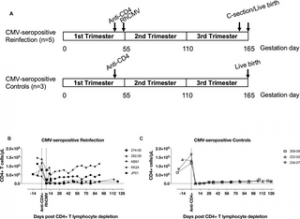Cytomegalovirus (CMV), a common herpesvirus, is a quiet threat that can lead to miscarriages and birth defects when transmitted from mothers to their developing fetuses. However, a new study offers a glimmer of hope. For the first time, researchers have unveiled a remarkable phenomenon: mothers who encounter CMV prior to pregnancy are significantly less likely to pass the virus on to their unborn children (Figure 1). This crucial discovery paves the way for the development of a vaccine that could safeguard both mothers and their babies.

Figure 1: Study design and kinetics of CD4+ T lymphocyte depletion in experimental groups. (A) Schematic of study design of cCMV transmission in pregnant CMV-seropositive rhesus macaques. (B-C) Peripheral blood CD4+ T lymphocyte counts following anti-CD4 antibody administration in (B) CMV-seropositive Reinfection group (n = 5); and (C) CMV-seropositive Control group (n = 3).
CMV, typically harmless when contracted before childbearing age, becomes a menacing foe during pregnancy. If transmitted to the developing fetus, it can result in miscarriage and a host of devastating birth defects, including cerebral palsy and hearing loss.
The research employed a nonhuman primate model that closely mimics human CMV infection and transmission. The findings were illuminating pregnant mothers exposed to CMV during the first trimester invariably transmitted the virus to their offspring, leading to a high rate of miscarriage. However, a fascinating revelation emerged when previously CMV-infected nonhuman primates encountered the virus again during their pregnancies – their offspring remained unscathed.
Understanding the protective role of pre-existing immunity against CMV transmission during pregnancy is a significant stride toward developing an effective CMV vaccine that could shield all pregnant women and their unborn children. This study’s revelations signify that if a mother possesses CMV immunity before conceiving, her immune system can adeptly shield her baby from congenital CMV transmission even if she encounters the virus during pregnancy. This newfound knowledge offers a ray of hope for expectant mothers, raising the prospect of a vaccine that can alleviate the shadow of CMV-related complications during pregnancy.
Journal article: Moström, M.J., 2023. Protective effect of pre-existing natural immunity in a nonhuman primate reinfection model of congenital cytomegalovirus infection. PLOS Pathogens.
Summary by Stefan Botha










